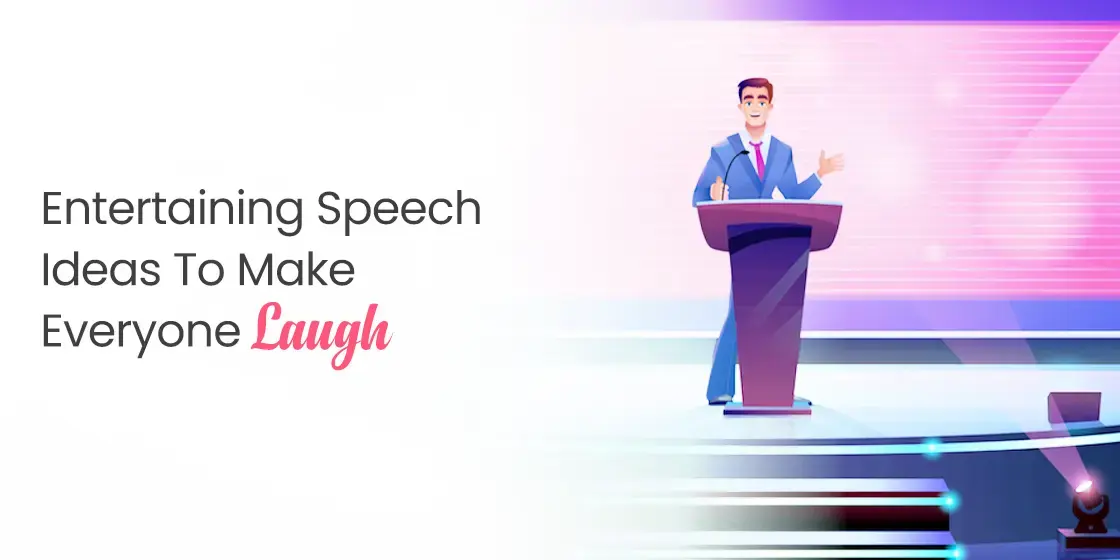Informative Speech Ideas To Remember
When working on any form of writing, one has to follow a set of guidelines to ensure that the written content complies with the conventions of that particular style. In a similar vein, informative speeches, too, have a distinct tone and way of delivery which has to be followed in order to ensure that the content is aligned with the structuring and nuances of the chosen medium. So, before we begin to discuss informative speech topics, let us make sure that you understand what an informative speech is, and what are its conventions?

What is an Informative Speech?
An Informative Speech is delivered to help describe, explain, and educate the audience about a particular subject matter. The topics for informative speeches can be innumerable. But the way we deliver the speech has certain rules (rule of three in speech writing) and guidelines that need to be followed in order to effectively deliver an informative speech. To better understand the concept behind informative speeches, let’s look at some examples of informative speeches.
Informative Speech Examples
- A Lecturer giving a seminar on the difference between informal speech-like writing vs academic writing
- A Doctor educating children about oral hygiene.
- Guest Speaker instructing students on how to apply for studying abroad.
- An opposition leader, giving a speech about the mismanagement by the ruling party.
What Are the Types of Informative Speeches?
There are four types of informative speeches: Descriptive, Demonstrative, Explanatory, and Definitive Speeches. Each of these speeches have their own use-cases, and help the speaker better convey information based on the type of topic you have chosen.
Descriptive Speeches
Whenever a speaker intends to inform their audience about a specific place, person or object, descriptive speeches help in setting the style of a speech. These kinds of speeches focus on creating a vivid imagery of the subject matter.
Suppose someone has been to a museum where they weren’t allowed to take a photograph, the best way of informing the audience about your experience is to give a descriptive account of your experience at that place.
By labeling our approach to a topic, we ensure to maintain the tone and style of our speech, focusing on the meticulous details of the subject matter without trailing off.
Definitive Speeches
The purpose of a definitive speech is to define a complex concept or theory to your audience. It essentially focuses on educating and explaining the audience about the subject matter, rather than simply describing it to them.
The difference in this approach is that unlike the descriptive speeches, it cannot simply focus on discussing the superficial and visual aspects of the subject matter.
This is because concepts are abstract, and definitive speeches focus on ensuring that the audience develops a deep understanding of the subject matter.
Demonstrative Speeches
Demonstrative speeches are usually a part of instructional sessions and training courses that provide a step by step guide to demonstrate how something is done, or how something works. You can simply call these how-to guides that are one of the most popular kinds of web searches, albeit these are, of course, in the form of a speech, and so they focus on the nuances of the said medium.
Besides that, in demonstrative speeches, it is also important for a speaker to focus on the chronology of each step to ensure that the entire process from start to finish is explained and demonstrated in a cohesive manner.
Among the several scenarios in which these types of speeches occur, some for example, are cooking, driving, and paragliding demonstrations.
Explanatory Speeches
Explanatory speeches can often be confused because of their similarity to descriptive and definitive speeches can make it difficult to differentiate them from the other two.
In a descriptive speech, when explaining something, the speaker focuses on creating a visual image for the audience to help them picture an event or an object. Likewise, when making a definitive speech the focus is primarily on explaining the essence of a concept or theory.
In contrast to these two, explanatory speeches offer a reasoning behind an event or an action. Suppose a government increases taxes on cigarettes; when addressing the listeners about the reasoning behind it, a public representative can make an explanatory speech to inform the audience that the decision was made to curb the increase in cigarette consumption.
By dividing informative speeches into different types and understanding the differences in each approach, speakers can easily decide which types are best suited for talking about a particular informative speech topic.
Still, in case you’re short on time and find it challenging to follow all the instructions that we’ve given in this article, contact us to avail the best speech writing services in the US.
How to Write an Informative Speech?
While writing an informative speech you need to remember some points that can massively help in improving the structure of a speech. FIrst of all you need to focus on the topic that you’ve chosen, or one which has been assigned to you.
Suppose the prompt you’ve been given asks you to write about an environmental problem or a particular event. You should begin by narrowing down your topic by making a list of everything that comes to your mind when you think about it.
If, for example, you’ve listed global warming, noise pollution, and deforestation, choose the one depending on your audience’s interest. Once done, research about the topic and begin creating the outline.
Deliver a memorable speech with our
expertly crafted speeches!

How to Create an Informative Speech Outline?
The structure of a speech should follow three key elements: the introduction, the body paragraphs, and the conclusion. Each of these three sections need to follow their own subset of elements, which we shall discuss further.
Once you’ve written a draft in the form of a keyword outline with the main points that you would like to discuss, move on towards focusing on each section separately.
Introduction
The introduction of the speech needs to be attention-grabbing. It can be done with the help of a quote, a question, an anecdote, or an interesting fact, anything that can help surprise the readers. Such introductions were also a popular characteristic of metaphysical poems as they would have surprisingly abrupt beginnings.
For instance, if the topic of a speech is “Importance of Branding and Marketing”, begin your speech by telling the audience how Pepsi, understanding the importance of branding, spent a whopping $1 million to revamp its logo design.
Once you’ve grabbed their attention. It’s important to share your thesis statement with the audience, telling them what the speech is about. A thesis statement explains the premise of your speech.
For example, if you’re going to talk about the “Causes of the French Revolution” from a foreign historian’s perspective, you should let the audience know.
The speaker should further elaborate what exactly they’ll discuss about the topic, so if they intend to highlight the Ten major events that led to the French Revolution, they should briefly mention them in a chronological manner. This helps the listeners know what to expect, and also helps them keep track of the speech.
Body Paragraphs
It’s important to remember that each of the body paragraphs should be properly organized with each idea logically presented in a chronological order. Which means that when speaking of what caused the French Revolution, you mustn’t speak about the Abolition of Feudalism, before The Tennis Court Oath, because the latter was the first event among the ten major ones.
Each paragraph should have a topic sentence to give readers an idea of what the following section of the speech will be about. That is because if you move on to discuss the second event without mentioning or naming it clearly, the audience can find it confusing to follow.
So the transitions between each paragraph should not be abrupt, rather they should be smooth and natural in their progression
Also, as informative speeches are based on facts rather than opinions, remember to mention the source of information for each highlight, because claims made in an informative speech should be substantiated with evidence.
Conclusion
The conclusion of an informative speech should summarize all the points discussed in the speech, reinstating the thesis statement.
Having summarized the speech mentioning the significant events, the speaker should make a call to action. For instance, ask them to read a book that has covered the topic extensively and/or approach history through multiple sources for an unbiased record of events.
Lastly, relate the informative speech topic to the current era to help the audience understand its relevance in their lives.
By following this pattern, you can effectively write on any informative speech topic. So make sure to follow the step by step instructions to ensure that you don’t miss adding anything.
Informative Speech Topics for Students
When it comes to choosing an informative speech topic for students, the utmost priority should be given to a topic’s relevance to your audience. To help our readers choose an interesting and relevant topic for their audience, we have created separate lists in various categories.
It goes without saying that a school, and a college audience differs in their interests and IQ levels, so when we speak of informative speech topics for students, we need to further specify the audience.
Informative Speech Topics for School Students
Informative speech topics for high school or middle school students are relatively easier, but they need to be interesting to keep the audience engaged. Consider writing on one of the following informative speech topics:
- Excessive Competition: Cause of Stress in Students
- How Common Use of Public Transport Can Help Heal the World?
- History of Graffiti Art
- Films Based on True Events
- Dangers of Sharing Personal Information Online.
- Should Teachers and Students Connect on Social Media
- How to Pick a Major in College?
- Reading Can Enhance Brain Function
Informative Speech Topics for College Students
Informative speech topics for College Students are relatively more complex. So it’s best to avoid choosing a topic that is basic, and does not add enough value to the listeners. That’s because the whole purpose of an informative speech is to present the audience with new information on a topic.
- Latest Advancements in the Field of Modern Science.
- How Emotional Support Animals Positively Affect Patients?
- Implications of Proxy Wars
- The Stigma Around Mental Health Issues
- Cancel Culture Fuels Intolerance in Society
- Incentives can Help Motivate Employees
- Effective Ways to Enhance Memory Retention
- Why the Gender Pay Gap Must End?
Higher education students have the advantage of choosing an informative speech topic from an innumerable amount of choices. Because, even seemingly simple topics can be looked into with a more in-depth analysis of the subject.
Tips for Informative Speaking
From writing an informative speech to delivering it to an audience, remembering some tips throughout the process can help ensure you do not miss any crucial element of writing and delivering a speech.
Use Appropriate Language
It’s important to choose a tone and style of language for your speech that is most suited for the topic, which is something that has more to do with the difference in the medium of writing and speaking rather than the difference of being formal and informal in style.
Depending on your audience, an informative speech topic can either have a casual and conversational tone, or have a more formal and professional. But in no way it should sound as if you’re reading a written essay, as the conventions of writing are very different from the convention of speaking.
In writing a speech, speaking out loud to construct the sentences of a speech before you write them down can help you maintain the intended style. Also, the choice of words should be suitable for the audience, so that if your audience is more general rather than specialized in a particular field, avoiding jargon is highly recommended.
While if you’re speaking to a specialized group, use of colloquialism and funny words is not preferable.
Speak of Basics, But Not Always
In a Definitive Speech, it is likely for a speaker to begin with the very basics in explaining a concept or theory. However, when delivering an informational speech to a specialized group of people, it is important to avoid wasting the designated time for your speech by explaining things that do not need an explanation.
Be Concise
It’s important to be concise when writing the body paragraphs. Your speech should condense each point into a punchy and concise piece of information backed with evidence.
This way, you can be economical with your words, and instead of going off the trail in the elaboration of a particular piece of information, you shall sound cohesive and coherent, which can help better inform your audience about the subject matter.
Show, Don’t tell
The most commonly given advice in the field of literary art, showing and not just telling your audience about the subject matter is what differentiates artistic expression from common language.
For when questioned how to write a speech, what could be the answer, other than to recommend an artistic approach towards the entire process.
Avoid Sounding Dull
If you’ve been assigned a topic that you aren’t personally interested in speaking about. It is crucial not to sound dull during the speech, doing so would guarantee the failure of your speech.
It’s the speaker’s job to ensure that the audience finds the thesis statement interesting, and understands how learning more about the subject matter can help benefit them, so that it’s easier to keep them engaged throughout the rest of the speech.
Be Factual
An informative speech has more to do with facts, rather than opinions. So it’s best to avoid your own take on things and be as factual as you can in presenting a clear picture of the subject at hand.
If you’re speaking about the cons of social media, you mustn’t focus on persuading everyone that social media is harmful. Taking a stance to establish your point against someone else’s only works with persuasive speech topics.
So it’s best to take a 360 view of the pros and cons of social media. Also, even if you choose to speak only about the cons, it can be done by being informational and objective.
Learn the Topic Inside-Out:
The topic that you’re speaking about should be researched thoroughly, because the audience may ask you questions regarding it. So, if choosing the topic is up to you, be sure to choose one that you are knowledgeable about.
The speaker should know more than what is part of the speech. Also, being knowledgeable about the topic makes the speaker more confident in their delivery, which makes a huge impact on the effectiveness of your speech.
Be Moderately Repetitive:
Repetition in speeches is a common method to ensure that the audience is following the speaker and does not lose track of the things discussed.
It’s actually a rhetorical device, and we highly recommend using it because repetition not only reminds the audience about what has been said, but also helps assert the importance of it.
Looking for
High-Quality Writing Service?
Conclusion
Public speaking can be a very daunting experience for many people. However, by working on improving your technique of writing and delivery skills, you can soon feel empowered for having the ability to effectively speak on any topic. For starters, informative speeches are the best, for they allow you to gain confidence and rehearse your skills in order to move on to more challenging styles such as persuasive and motivational speeches.
FAQs
| What are the 4 types of informative speeches? Informative speeches are divided into 4 different types: Explanatory, Descriptive, Demonstrative, and Definitive. |
| What are the 5 main categories of topics for informative speeches? An informative speech does not have 5 main categories, instead there are four, which include Descriptive, Demonstrative, Definitive, and Explanatory speeches. |
| What are the parts of informative speech? Informative speeches can be structured into 3 parts to create an effective speech: An introduction, body paragraph, and finally, a conclusion. |
| How do you write an attention getter for an informative speech? An attention getter or a hook for an informative speech can be written with a funny joke, interesting quote, or with insightful statistics to quickly grab the attention of the audience. |

Unleash your brand story`s potential with eContentSol – your creative writing companion. We craft narratives that captivate. Ready to elevate your content game? Dive into creativity with us and let`s bring your ideas to life.


